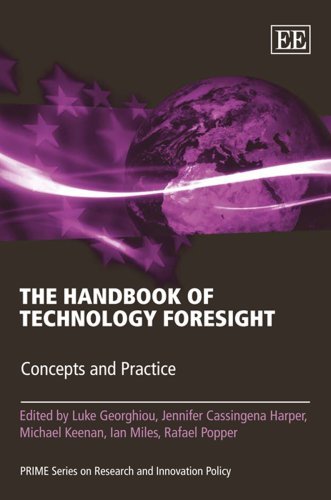The NEED
 The Handbook of Universal Foresight and The Handbook of Foresight Methods aim to update and expand the work done by some of the Editors and Contributors in The Handbook of Technology Foresight in 2008. The Foresight practice in the world has evolved considerably partly because of the emergence of new players conducting foresight in practically all world regions. Similarly, the growing interdisciplinary nature of foresight, which has pushed the field into areas that go beyond the obvious 'technology foresight' activities, requires a more holistic, systematic and foreward-looking study of foresight impact, methodology and practice.
The Handbook of Universal Foresight and The Handbook of Foresight Methods aim to update and expand the work done by some of the Editors and Contributors in The Handbook of Technology Foresight in 2008. The Foresight practice in the world has evolved considerably partly because of the emergence of new players conducting foresight in practically all world regions. Similarly, the growing interdisciplinary nature of foresight, which has pushed the field into areas that go beyond the obvious 'technology foresight' activities, requires a more holistic, systematic and foreward-looking study of foresight impact, methodology and practice.
The RESPONSE
Thess Handbooks will look into the 'universal' use of foresight in a wide-range of areas and application settings. New impacts, methodologies and practices will be identified and analysed. Overall, the Handbook will be based on a systematic mapping of foresight 'best' practices, outcomes and players.
The MEANS
The Editors and Contributors will use new knowledge resulting from the following activities:
- The real-time Delphi Survey structured around the six parts of the Handbook.
- State-of-the-art analysis of excellent and impactful Foresight Case Studies.
- Targeted interviews and dialogues with key foresight practitioners, organisers and users providing insights of foresight-driven research, education, innovation and regulation.
- Systematic data analytics of publications, keynotes and media coverage.
- State-of-the-art Futurepedia (Wiki-like Foresight Platform) structured around the Handbook.
The INITIATIVE
“Universal Foresight” (UF) is a bottom-up initiative that emerged from the growing need to gather, analyse and share state-of-the-art knowledge about foresight practices, outcomes and players by world regions, by application areas and by areas of science. It represents a global multi-stakehodler partnership to advance knowledge on foresight-driven research, education, innovation and regulation processes. UF aims to co-create a Wiki-Foresight Ecosystem (Futurepedia) that will effectively integrate the perspectives of the quaduple helix of societal stakeholders, namely government, business, civil society and research actors. This initiative investigates the scope of universal foresight as a practice that enables the anticipation, recommendation and transformation of possible futures.
The MOTIVATION
The Editors of the Handbook see foresight as a key driver of technological, economic, environmental, political, social, ethical and spatial (TEEPSES) progress. The Universal Foresight initiative will foster debate on foresight contributions to science and research policy, technology development, sustainable innovation, businesses and organisations, territorial and urban development, as well as the assessment and management of wicked problems, wild cards and the so-called moon-shots.

